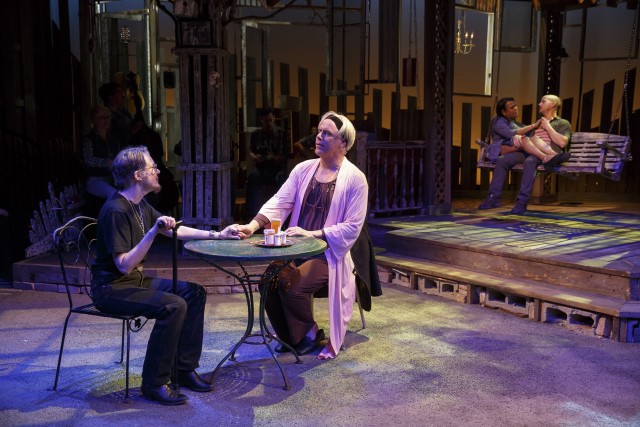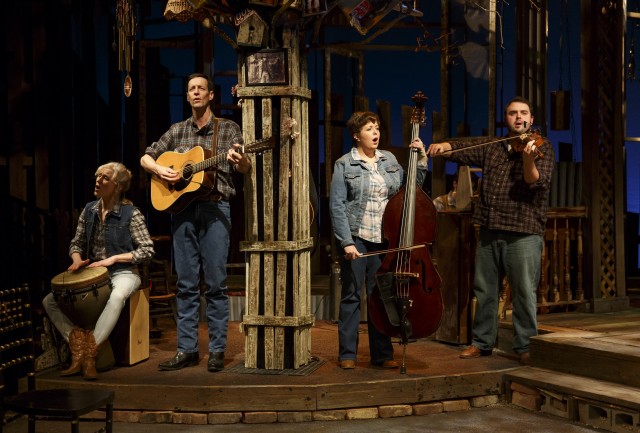
Couples Robert (Annette O’Toole) and Lola (Jeff McCarthy) and Carly (Aneesh Sheth) and Jackson (Jeffrey Kuhn) deal with LGBTQ issues in SOUTHERN COMFORT (photo by Carol Rosegg)
Anspacher Theater at the Public Theater
425 Lafayette St.
Through March 27, $40-$65
212-967-7555
www.publictheater.org
At intermission of Southern Comfort, I was standing just outside the Anspacher Theater at the Public, next to a group of older men and women who were debating whether to go back inside for the second act. “Tell me, why are we seeing this again?” one gentleman asked. “We’re seeing this because it’s important,” one of the women answered. “It’s important for us to see and understand people who are different.” The man looked over at me with a shrug, and I couldn’t help but shrug back. I went back inside for the rest of the show; some of the people in that group opted to go home instead, which was not a bad decision. Southern Comfort is a sappy, treacly adaptation of Kate Davis’s award-winning 2001 documentary about ailing transgender Robert Eads and his close circle of friends, which he calls his “chosen family.” Ten years in the making, the musical, which was conceived by Robert DuSold and Thomas Caruso, with book and lyrics by Dan Collins and music by Julianne Wick Davis (who previously collaborated on Trevor and When We met), follows a dying Eads (Annette O’Toole) as he continues his monthly picnics at his wooded home in Georgia with transgender Jackson (Jeffrey Kuhn), who is considering getting a phalloplasty to physically complete his transition; Carly (Aneesh Sheth), Jackson’s new transgender girlfriend; burly transgender Sam (Donnie Cianciotto) and his girlfriend, Melanie (Robin Skye); and Robert’s new lover, transvestite Lola Cola (Jeff McCarthy), a man’s man who is nervously just starting to adjust to his preferred lifestyle. They are all considering whether to attend the annual Southern Comfort convention in Atlanta, a gathering place for the LGBTQ community, where they can be themselves without any of the usual consequences. (Southern Comfort is a real conference and symposium that recently relocated to Fort Lauderdale after twenty-four years in Atlanta; the convention boasts more than eighteen thousand attendees over its history and bills itself as “the largest gathering of the transgender community in the world.”)

Folk band plays music and gets involved in the narrative in rustic musical (photo by Carol Rosegg)
But while the documentary is a warm and intimate examination of Eads and his friends and family, the musical merely celebrates its own existence, with only the most tangential and, dare we say, dull and ordinary moments of conflict and drama. Will Melanie bring Sam to her company holiday party? Will Robert’s parents finally accept who he has become? (This relationship was changed from the film.) Will Lola go to the convention and join the greater LGBTQ community? While these are all valid questions, their treatment in Southern Comfort does not make for exciting or compelling theater; instead, they come off more like plot points in a Lifetime movie. Even the titles of the songs are rather plain and obvious (as are the lyrics): “Grace,” “Women,” “Bless My Heart,” “Walk the Walk,” “Chosen Family,” “Home.” James J. Fenton’s set is rustic and inviting, including a swing and a tree festooned with photos and other memorabilia from the characters’ lives. Around the tree, the band plays folksy music, and some of the musicians occasionally narrate brief bits or play small roles; the crack band consists of Lizzie Hagstedt on bass, Joel Waggoner on violin and piano, Morgan Morse on piano and guitar, Elizabeth Ward Land on piano and percussion, and musical director David M. Lutken on harmonica and various stringed instruments. The acting is solid if unspectacular, led by an unrecognizable O’Toole (Hamlet in Bed, Cat People) and a bold McCarthy (Urinetown, Side Show). Perhaps Southern Comfort would have been more effective ten or fifteen years ago, closer to the time when the film came out and made such an impact. Or maybe part of the problem is that the show is essentially preaching to the converted at the Public Theater, where the audience has no issues with who the characters are and what they want to do with their lives. Of course, horrible, unjust, and unfair treatment of the LGBTQ community continues around the world, and those stories need to be told; unfortunately, Southern Comfort is not the musical to do it.